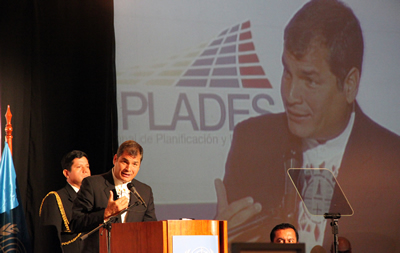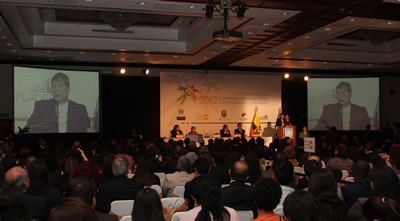"We Have to Be Prepared for an Increasingly Urbanized Future"
Topic(s)
In Quito, the UN high-level official inaugurated the Ad Hoc Committee on Population and Development. She said this was "the opportunity to make the leap to environmental sustainability and equality".

(5 July 2012) With the attendance of 54 country delegates, the meeting of the ECLAC Ad Hoc Committee on Population and Development 2012 started on Wednesday in Quito, Ecuador, and will focus on topics such as population, territory and sustainable development.
The opening ceremony, attended by the President of Ecuador Rafael Correa, was inaugurated by the Executive Secretary of ECLAC Alicia Bárcena; the United Nations Population Fund (UNFPA) Director for Latin America and the Caribbean Marcela Suazo; the National Secretary of the Secretariat of Planning and Development of Ecuador (SENPLADES) Fander Falconí; and the Minister of Foreign Affairs, Commerce and Integration of Ecuador Ricardo Patiño.
At the inauguration, Alicia Bárcena said that "territory matters... A lot. We have to be prepared for an increasingly urbanized future". "This is the opportunity to make the leap to environmental sustainability and equality," she added. These were the main topics during the meeting, which sets planning at the core of the public agenda.
Participants highlighted the territorial dimension of public policies and strategies for closing equality gaps, deprivation and segregation deriving from the place where people live.
Likewise, they underlined the importance of advancing effectively on the integration of population issues in plans, policies and development programmes at all political and administrative levels.
The President of Ecuador Rafael Correa restated that one of the main challenges in Latin America is to take into account two common phenomena: urbanization and territorial disparities.
"Behind demographic behaviors lie specific economic, social and cultural realities. The poorest social groups and territories report excess mortality and high fertility, as well as a high propensity to migrate. Modifying these issues implies taking action on their fundamental drivers: exclusion and inequality," he explained.
"The moral obligation of our time is to erradicate poverty. Through an equal distribution, each Ecuadorian family would have thrice the amount necessary for overcoming the poverty line," claimed the Ecuadorian official.
In turn, Minister Fander Falconí insisted that the topics to be discussed at the meeting of the Ad Hoc Committee on Population and Development are fundamental for understanding the particular characteristics of our societies.
"While population growth rates are progressively decreasing, pressure on resources, as well as consumption disparity, forces us to rethink public policies related to population," expressed Falconí.
Likewise, UNFPA Regional Director Marcela Suazo noted that "inequalities become evident in the territory and this is where agendas for addressing problems persisting in the region are defined".
"The region of Latin America and the Caribbean shows a set of significant political gaps clearly indicating where and how we could have a more effective role in fostering development, reducing poverty and inequality and promoting fundamental human rights," pointed out Suazo.
In her address, Alicia Bárcena presented the main ideas of the ECLAC document entitled Population, territory and sustainable development, elaborated in colaboration with UNFPA, which will inform the debates during the meeting.
According to the document, currently two out of three Latin Americans live in cities with more than 20,000 inhabitants, and metropolis (1 million or more inhabitants) have increased from eight in 1950 to 56 in 2010. One third of the population is concentrated in metropolis. "To make use of the opportunities offered by urbanization, future development must be planned in order to reduce accumilated defficiencies and make the leap to a structural change," commented Bárcena.
The study also underlines the importance of rural-urban migration, which has reduced task force in rural areas and partially neutralized the positive effect of the demographic bond (the largest proportion of the population being economically active compared to the economically dependent sector of population), among other topics.
Bárcena remarked that a better State is necessary, as well as highlighting the importance of politics as a privileged space for governments and citizens to build the links and covenants necessary for democratically drafting an agenda that focuses on universal and equal rights so as to gather together policies on stability and economic growth, convergent productive development, territorial harmonization, promotion of quality employment and increased social equality.
"There are no sole models," said Bárcena. "Each country will have to build its own State-market-society equation and its own spaces for discussion".
The UN high-level official also stressed the progress made in Ecuador in terms of population and development. The country has reassessed planning and the role of the State with a long-term vision. "In the 2008 Constitution, diverse social and territorial integration has been given a strategic significance, with equality at the core, and based on the ownership and universality of rights of citizens," she explained.
See also:
- Speech by the President of Ecuador, Rafael Correa (in Spanish)
For further questions, please contact ECLAC's Public Information and Web Services Unit. E-mail: dpisantiago@cepal.org ; tel.: (56 2) 210 2040
Related content
ECLAC Member States Meet in Ecuador for Ad Hoc Committee on Population and Development
At the meeting, priority issues for Latin America and the Caribbean related to population, territory and sustainable development will be discussed.

It Is Necessary to Reduce Territorial Inequalities for Promoting Sustainable Development
Government representatives from Latin America and the Caribbean concluded the meeting emphasizing the importance of mainstreaming population issues in public policies.

Sesión inaugural del Comité Especial de la CEPAL sobre Población y Desarrollo
Por Alicia Bárcena, Secretaria Ejecutiva de la CEPAL
Country(ies)
- Latin America and the Caribbean
-
Ecuador